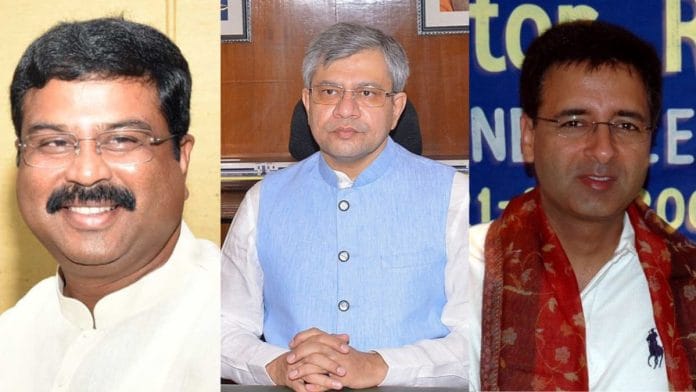Who calls the shots in Odisha: Dharmendra Pradhan or Ashwini Vaishnaw?
As the first BJP government under Chief Minister Mohan Charan Manjhi approaches its one-year anniversary in Odisha, the corridors of power are abuzz with speculation about the declining influence of Union Education Minister Dharmendra Pradhan in the state’s affairs. Pradhan and his coterie, which includes leaders such as Samir Mohanty, Golak Mohapatra and Thakur Ranjeet Das, appear to have lost their grip on power. The emerging power centre in Odisha is Ashwini Vaishnaw, Union Minister for Railways, IT, and Information and Broadcasting.
Over time, Vaishnaw—a former IAS officer from the Odisha cadre whose family has been associated with the Rashtriya Swayamsevak Sangh—has forged close ties with both Prime Minister Narendra Modi and Union Home Minister Amit Shah. His control over three key cabinet portfolios has further bolstered his stature.
According to both government and bureaucratic sources in Odisha, the decline of Dharmendra Pradhan’s clout has directly contributed to Vaishnaw’s ascendancy in the state’s political landscape. For instance, Vaishnaw is widely believed to be the driving force behind the Odisha government’s auction of mines. Regarded as close to VK Pandian—the former IAS officer whose influence over ex-Chief Minister Naveen Patnaik was a major election issue for the BJP—Vaishnaw was re-elected to the Rajya Sabha for a second term in February this year, once again with the support of the BJD.
Also Read: Ex-IAS Navneet Sehgal flaunts his political ‘tuning’—Yogi, Akhilesh, Satish Mishra at same function
Randeep Surjewala’s power play at AICC meet
At the All India Congress Committee session in Ahmedabad, Randeep Surjewala—a close confidant of Rahul Gandhi—seized the opportunity to demonstrate his authority and influence within the party. Appointed convenor of the drafting committee for the AICC meeting, Surjewala refused to share the draft resolution with several other members of the committee.
This came to light when some members raised objections to shortcomings in the draft during the Congress Working Committee meeting. For instance, the draft made only a brief and muted reference to the Congress party’s commitment to secularism—and that, too, merely as part of a quote attributed to Vallabhbhai Patel. The party later addressed this omission by elaborating on the principle in the final resolution.
Nayab Saini govt’s crackdown on songs & singers
The Haryana government’s ongoing crackdown on songs that it claims promote “gun culture” and violence has claimed more casualties—most recently, Haryanvi rapper Dhanda Nyoliwala’s track Illegal, which had garnered over 2.2 million views on YouTube since its release on 19 October, 2024. The song has now been removed from the platform.
Alongside it, Amit Saini Rohtakiya’s Yo Rohtak Se Mere Bhai-2, which had amassed 7.4 million views, has also been banned.
This brings the total number of banned songs to over 30, with artists, such as Masoom Sharma, Gajender Phogat, Ankit Baliyan, and Narendra Bhagana, caught in the crosshairs of what the state describes as a crackdown on anti-social content.
According to the government, these songs—characterised by aggressive lyrics and tales of bravado—glorify gun violence and criminality, potentially influencing impressionable youths towards unlawful behaviour. Chief Minister Nayab Singh Saini, who launched the initiative during a law-and-order review meeting in Karnal earlier this year, has consistently emphasised the need to curb such material.
However, artists present a contrasting narrative—one of frustration, perceived bias and alleged selective targeting. Masoom Sharma, the worst affected, has seen eight of his songs banned, including popular tracks such as Tuition Badmashi Kaa and Khatola.
The 33-year-old singer from Jind has been vocal in his criticism, claiming targeted discrimination. In a Facebook Live session last month, Sharma argued that if Haryanvi songs are disproportionately targeted, fans will simply turn to Punjabi tracks or Bollywood films, which often portray violence without facing similar scrutiny. He has even accused a senior official in the state’s publicity cell of harbouring a personal vendetta stemming from an old rivalry.
Meanwhile, Gajender Phogat—himself a singer and Officer on Special Duty (Publicity) to Chief Minister Saini—faced an awkward situation when his own song, Tadke Paavegi Teri Laash Nahar Mein, was banned. Phogat, however, claimed that he personally requested its removal and pledged to release a “clean” version as a replacement. Yet, his government position and proximity to power have done little to silence allegations of favouritism and double standards.
(Edited by Radifah Kabir)
Also Read: ‘Nepo kid’ row in UP’s IAS circles & the new buzzword in health ministry corridors






